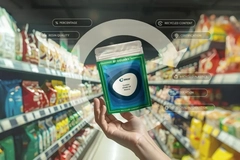Circle Economy: Reusable packaging can normalize through alternative branding and inter-industry collaboration

02 Nov 2020 --- From scientific studies to expert plastic pollution warnings, the debate continues on whether reusable packaging is more environmentally protective and sustainable than “green”-branded single-use packaging.
Despite growing evidence in favor of reusable approaches, many consumers reportedly remain convinced of the convenience of single-use packaging formats.
Education and alternate branding may trigger the necessary mentality switch to create more circular and reusable models in the packaging industry, Tamara Veldboer, senior consultant at Circle Economy tells PackagingInsights.
Circle Economy is a Netherlands-based not-for-profit organization helping businesses assess and embed circularly at their cores.
The company recently published a report entitled Will You Be My Partner? on how businesses can establish successful collaborations for a circular economy.

Veldboer discusses collaborative initiatives, urgent policymaking and business marketing as tools to support reusable packaging as a preferred alternative that “weighs more strongly than single-use.”Switching to reusable packaging requires retailers to contribute to an infrastructure in which consumers can change their purchasing behavior, says Veldboer.
Rethinking reusable
The reusability debate often ends where it should just get started: the case of convenience. It is easier for consumers to choose to buy a coffee at the train station shop and dispose of its paper cup shortly after, rather than carry around a mug all day – an easy win for single-use.
But the discussion is much more nuanced. Veldboer points out that the perceived benefits of single-use packaging turn into disadvantages when considering poor disposal and environmental waste.
“There is a willingness to make [environmentally] sustainable purchases, although actual numbers are different. There is a scattered landscape of trademarks and labels, which makes it unclear what is the actual right choice if you want to be a sustainable consumer.”
Innova Market Insights research indicates that 85 percent of US and UK consumers expected companies to invest in sustainability in 2019, up from 64 percent in 2018.
Environmental sustainability demands for packaging are maturing into traceability expectations, as indicated by the market researchers’ number one trend for 2021: Traceability Triumphs.
.jpg) Senior consultant Tamara Veldboer at Circle Economy.Brands adopting and pairing new packaging technologies – such as barcodes and near-field communication technology – with creative, meaningful storytelling are predicted to be successful.
Senior consultant Tamara Veldboer at Circle Economy.Brands adopting and pairing new packaging technologies – such as barcodes and near-field communication technology – with creative, meaningful storytelling are predicted to be successful.
Collaboration: A business case
From a corporate perspective, reusable models have a lot to offer, according to Veldboer. The main opportunities for closing the packaging loop include:
- Entering new markets or increasing market share.
- Reduced costs and risks.
- Triggering innovation capacity.
- Attracting and retaining talent.
- Delivering greater customer value.
- Aligning with public expectations around sustainability.
Circle Economy’s work includes measuring corporate circularity and creating circular roadmaps for businesses to close the loop on business model designs, financing and innovation.
“With current globalized value chains, reengineering the current linear system cannot be achieved in isolation and therefore, businesses as central actors in our global economy need to collaborate,” Veldboer underscores.
She adds that collaboration in itself is not new – not even for competitive Western businesses. “A balanced mindset in which collaboration is the norm with a dash of healthy competition to challenge all actors to move to the next level of circularity will be ideal.”
Policy power
To better support businesses in their circular endeavors, governmental bodies should step up to the plate, says Veldboer.
“What could we learn from the ‘preloved’ branding or vintage clothing and furniture?” prompts Veldboer.Governmental agencies could play a major role by setting financial incentives and penalizations to make the economic potential of reusable better than single-use.
Veldboer also envisions governments creating incentives via subsidies to trial reusable packaging models. Latest examples of reusable packaging trials at major retailers and food venues include Burger King’s global TerraCycle Loop partnership and Unilever’s refill trial in the UK.
Ultimately, a circular economy is a means to an end and a “promising approach” worldwide, Veldboer maintains.
“In the spirit of true collaboration, a sustainable future will become a reality if we work together across artificial boundaries and realize we live in a world with many skills and perspectives that can complement rather than contradict each other as we switch from single-use to reusable. The circle of life.”
By Anni Schleicher












